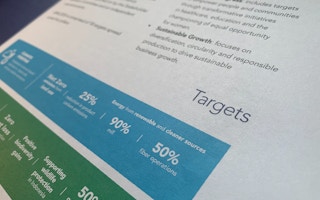2022 was a brutal year for the credibility of environmental, social and governance (ESG) investing. So it is, perhaps, unsurprising that the business community does not have much faith in the data used in corporate sustainability reports.
To continue reading, subscribe to Eco‑Business.
There's something for everyone. We offer a range of subscription plans.
- Access our stories and receive our Insights Weekly newsletter with the free EB Member plan.
- Unlock unlimited access to our content and archive with EB Circle.
- Publish your content with EB Premium.
According to a global study of more than 1,000 executives with technology or ESG responsibilities in the oil and gas, mining, transport and agriculture sectors, two-thirds (76 per cent) do not trust the data their competitors are using in sustainability reports and claims.
The study by British satellite communications firm Inmarsat also found that 80 per cent of executives believe their competitors are more focused on perception than achieving tangible sustainability outcomes.
About the same proportion – 81 per cent – believe that their business is more environmentally and socially sustainable than their competitors.
Businesses are also unwilling to share their ESG data, which has implications for industry transparency and benchmarking. Less than a half (47 per cent) of respondents said they are comfortable sharing all of their ESG data with third parties to improve industry reporting and benchmarking.
The study suggests that a lack of verifiable hard data, and the willingness to share it, could be undermining trust and slowing progress in corporate sustainability.
“Work needs to be done to create an environment where partners inside and outside organisations feel comfortable sharing both mandatory and voluntary ESG data so businesses can collaborate to deliver the profound sustainability transformation we all need,” the report reads.
John Pabon, founder of Melbourne-based sustainability consultancy Fulcrum Strategic Advisors, said the study’s findings reflect negative perceptions of the ESG sector that have developed in recent years.
ESG investing came under serious scrutiny in 2022, with BlackRock and other asset management firms facing criticism from financiers who said sustainable investing compromises returns. ESG rating standards were also called into question, with growing pressure to standardise how data is defined.
Pabon said some of the industries represented in Inmarsat’s study, oil and gas in particular, are notorious when it comes to greenwashing, so their lack of faith in ESG data could be a case of executives “projecting”.
However, he added that faith in ESG data should be growing, as there is now far more focus from the investment community on ensuring numbers are verifiable, and investors will want to protect the integrity of their investments.
In Australia, the government has started cracking down on greenwashing by penalising companies making dubious sustainability claims, Pabon noted. This will push companies to get better at data gathering and measurement, he said.
China unveiled plans to tighten rules for “green” funds to weed out greenwashing in December, while this month Singapore’s financial regulator issued guidelines for retail investors to follow to avoid making overclaims with ESG data.
Pabon said that ESG data is “certainly not perfect”. There are always going to be laggards and companies that slip through the cracks,” he said. “But the needle is moving in the right direction, so it is surprising to see sentiment moving the other way.”








